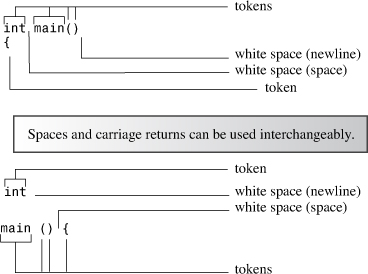C++ Source Code Formatting
Some languages, such as FORTRAN, are line-oriented, with one statement to a line. For these languages, the carriage return (generated by pressing the Enter key or the Return key) serves to separate statements. In C++, however, the semicolon marks the end of each statement. This leaves C++ free to treat the carriage return in the same way as a space or a tab. That is, in C++ you normally can use a space where you would use a carriage return and vice versa. This means you can spread a single statement over several lines or place several statements on one line. For example, you could reformat myfirst.cpp as follows:
#include <iostream>
int
main
() { using
namespace
std; cout
<<
"Come up and C++ me some time."
; cout <<
endl; cout <<
"You won't regret it!" <<
endl;return 0; }
This is visually ugly but valid code. You do have to observe some rules. In particular, in C and C++ you can’t put a space, tab, or carriage return in the middle of an element such as a name, nor can you place a carriage return in the middle of a string. Here are examples of what you can’t do:
int ma in() // INVALID -- space in name
re
turn 0; // INVALID -- carriage return in word
cout << "Behold the Beans
of Beauty!"; // INVALID -- carriage return in string
(However, the raw string, added by C++11 and discussed briefly in Chapter 4, does allow including a carriage return in a string.)
Tokens and White Space in Source Code
The indivisible elements in a line of code are called tokens (see Figure 2.3). Generally, you must separate one token from the next with a space, tab, or carriage return, which collectively are termed white space. Some single characters, such as parentheses and commas, are tokens that need not be set off by white space. Here are some examples that illustrate when white space can be used and when it can be omitted:
Figure 2.3. Tokens and white space.

return0; // INVALID, must be return 0;
return(0); // VALID, white space omitted
return (0); // VALID, white space used
intmain(); // INVALID, white space omitted
int main() // VALID, white space omitted in ()
int main ( ) // ALSO VALID, white space used in ( )
C++ Source Code Style
Although C++ gives you much formatting freedom, your programs will be easier to read if you follow a sensible style. Having valid but ugly code should leave you unsatisfied. Most programmers use styles similar to that of Listing 2.1, which observes these rules:
• One statement per line
• An opening brace and a closing brace for a function, each of which is on its own line
• Statements in a function indented from the braces
• No whitespace around the parentheses associated with a function name
The first three rules have the simple intent of keeping the code clean and readable. The fourth helps to differentiate functions from some built-in C++ structures, such as loops, that also use parentheses. This book alerts you to other guidelines as they come up.
C++ Statements
A C++ program is a collection of functions, and each function is a collection of statements. C++ has several kinds of statements, so let’s look at some of the possibilities. Listing 2.2 provides two new kinds of statements. First, a declaration statement creates a variable. Second, an assignment statement provides a value for that variable. Also the program shows a new capability for cout.
// carrots.cpp -- food processing program
// uses and displays a variable
#include <iostream>
int main()
{
using namespace std;
int carrots; // declare an integer variable
carrots = 25; // assign a value to the variable
cout << "I have ";
cout << carrots; // display the value of the variable
cout << " carrots.";
cout << endl;
carrots = carrots - 1; // modify the variable
cout << "Crunch, crunch. Now I have " << carrots << " carrots." << endl;
return 0;
}
A blank line separates the declaration from the rest of the program. This practice is the usual C convention, but it’s somewhat less common in C++. Here is the program output for Listing 2.2:
I have 25 carrots.
Crunch, crunch. Now I have 24 carrots.
The next few pages examine this program.
